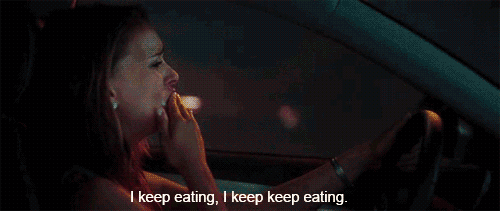Trigger warning: This talks about binging and eating disorders.
When people think about eating disorders, they tend to think about anorexia nervosa or bulimia nervosa. But a key eating disorder that is often overlooked is binge eating disorder. This disorder was just added in the new DSM-5, which is used to diagnose mental disorders. Many people assume when you binge eat it is a choice you make, but with binge eating disorder that is not the case. It is a serious mental illness.
What is binge eating disorder?

Gif courtesy of tumblr.com
Binge eating disorder is where the person suffering will binge on food a lot of times. A binge is when a person eats larger than normal quantities of food in a short amount of time. But unlike bulimia, the person suffering does not purge afterward. This is now the most common eating disorder in America.
What are the signs of binge eating disorder?

Photo courtesy of MUI Daily News
People with this disorder will binge repeatedly and persistently. In many cases the person suffering will eat many more calories than needed. Sometimes a binge can result with the person consuming up to 10,000 calories at once. People suffering eat very quickly and tends to result into feeling very full and uncomfortable feeling. Then after the binge, people suffering feel awful about the amount of food they ate. This commonly co-occurs with mood disorders, like depression. Obesity does not mean a person is suffering from binge eating disorder, but 2/3 of people suffering from binge eating disorder are overweight.

Gif courtesy of giphy.com
Binge Eating Disorder needs to be given more attention and recognized as being as an actual disorder. It is not like when you eat an extra slice of pizza and feel too full. This is a condition in which people are suffering from a mental illness, and not just eating a few extra chips.
Struggling with an eating disorder is not easy to live with and recover from. If you or someone you know is suffering, please reach out and get help. It is important to remember that you are not alone in your struggle.
Find resources here, at the National Eating Disorders Association website.




